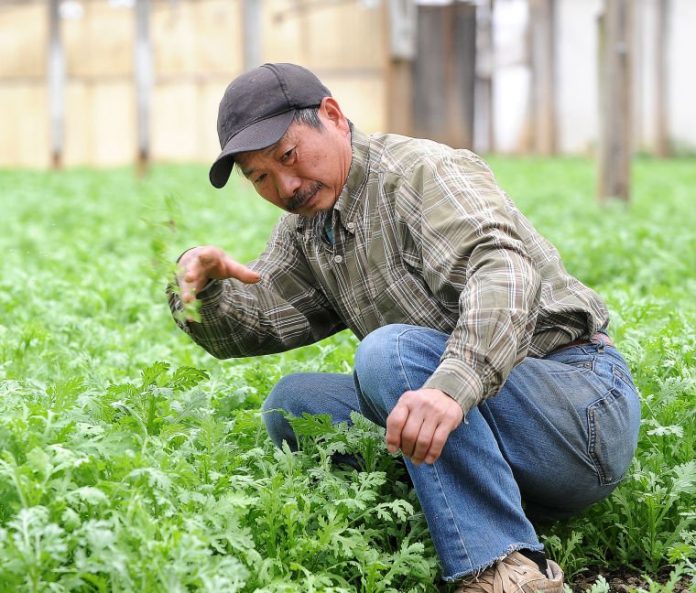
Vegetable grower Xay Duc Hoang, 60, brims with confidence on his modest north Morgan Hill farm, despite his diminutive stature, his distance from his native country and his limited ability to speak English.
But Hoang – who is no stranger to hardship after arriving in the U.S. with his wife and first-born daughter from an oppressive north Vietnamese regime more than 30 years ago – isn’t too proud to admit that a $9,000 fine recently imposed on his business by state regulators for failing to write his name atop an employee’s wage statements will cripple his ability to make a living.
Hoang’s operation, which consists of a cramped layout of unsophisticated greenhouses, employs five people, including himself and his wife, he said. His annual household income is about $55,000. Two of their five grown children live on the farm as well.
A fine of $9,000 would make it difficult for Hoang to meet his tax and insurance obligations, and even basic living expenses, he said.
The farmer is one of three Asian growers in Morgan Hill cited for labor code violations in recent months by the California Department of Labor Standards Enforcement. Area farming and legal advocates have rallied around these growers in an effort to convince regulators the ensuing fines are “excessive” and maybe even illegal.
“I think the challenge is the violation seems very small and the fine seems very large for these growers,” Executive Director Jennifer Scheer of the Santa Clara County Farm Bureau said. “We want people to be accountable, and these fines don’t get at that.”
She added the issue of immigrant farmers being levied penalties for honest mistakes or misunderstandings of procedure has grown into a problem for some.
Furthermore, the inspection process for labor code violations at the three farms was “intimidating” to the immigrants who speak little or no English, advocates argue.
“They thought (Hoang) spoke perfect English,” said Ken He of the Bay Area Chrysanthemum Growers Association, referring to the inspectors who visited Hoang’s farm and subsequently cited him October 2012. Hoang speaks Cantonese.
As of Wednesday, Hoang is still challenging his $9,000 fine with an appeal to the district court, according to Janelle Orsi of the Sustainable Economies Law Center, a nonprofit organization which has advocated for the three growers.
In other cases – such as that of Hoang’s neighbor Fanny Tam – inspectors might call a translator at the DLSE’s offices when they learn the farmer does not speak English. But the resulting attempt at a conversation between the employer and inspector through a mobile phone being handed back and forth is confusing, He said, in the midst of translating for Hoang and Tam at Hoang’s dinner table one afternoon last week.
In all three local cases, the violations are related to incomplete wage statements for the growers’ employees. Aside from the fact that Orsi thinks the growers should get some grace on this mistake, she also takes issue with the fact that all three citations appear to list the wrong labor code of which they were in violation, she explained in a lengthy letter pleading for some leniency for the growers to California Labor Commissioner Julie Su.
The inspector’s misidentification of the labor code violation is reason alone to dismiss the fines, Orsi argues. The SLEC also maintains that the fines are “unconstitutionally excessive.”
Su noted that regulators try to educate all employers, regardless of their native tongue, of their requirements under the labor code. Informative pieces on the Department of Industrial Relations and other agencies’ websites are translated into several languages, and the office conducts workshops throughout the state for all ethnicities that are common in California. However, she acknowledged that the “biggest challenge” is translating out in the field, during inspections.
“Ignorance of the law is not an excuse,” added Su. “There are other employers in the same industry who are working to get it right, so we don’t want to create this incentive to not worry about compliance until you’re caught – so those who do make every effort to do it correctly are not competing against those who aren’t.”
Hoang – the owner of Kam Hoang Farm on Kalana Avenue – was cited for failing to write his name rather than his business name on his employee’s wage statement.
As Hoang walked visitors through his greenhouses last week, he pointed out some of the green, leafy vegetables currently in season that fall into the category of “Chinese vegetables.” These include Chinese chive, bok choi (and other kinds of Chinese cabbage), yam leaves, Chinese celery, several types of Chinese spinach and others.
The 2013 Santa Clara County crop report noted that Chinese vegetables raked in about $4 million in sales last year, placing it 13th on the list of the county’s top-grossing crops. There are about “70 or 80” Chinese vegetable growers in the South Valley, Scheer estimated.
Tam, who was cited about the same time as Hoang, said (through He translating) that her initial fine of $5,000 was reduced to $3,000 after she was able to clarify some of the inspectors’ misunderstandings at a citation hearing.
Still, $3,000 is a significant chunk of Tam’s $20,000 annual income, she explained in Cantonese.
Tam immigrated to Morgan Hill in 1986 from China with her husband, who has since died, according to He. The couple and their family grew flowers until about 2006, when that market started dwindling.
The third case cited in Orsi’s letter is that of Siu Wah Mok, the letter says. The household income for Mok and his wife is about $13,000, and he is on the hook for a $3,000 fine.
Mok’s fine was reduced from $6,000, after he was able to explain at his citation hearing that his wife is his business partner rather than an employee, Orsi’s letter says. He tried but was unable to communicate this when inspectors visited his farm about a year ago.
Orsi’s letter, dated Oct. 7, pleads with Su to dismiss the fines imposed on Hoang, Tam and Mok. As of Wednesday the SELC had not received a response from the DLSE.
She also notes that the process of understanding and challenging the citations is a costly, time-consuming effort for the growers, and without pro bono legal assistance they likely would have been required to overpay.
One recommendation from Orsi and other advocates is for regulators to issue “stop orders” or warnings for first-time offenders rather than hefty fines.
Su said for some types of labor violations, outreach might be offered before a fine is levied. But in the case of violations related to wages or worker’s compensation requirements, “We don’t have the option to look the other way,” she said.
Su added that the Morgan Hill inspections were part of a “joint operation of the Labor Enforcement Task Force.” The inspections were not prompted by any complaints.
Another advocate for area growers said it’s ineffective to enforce the labor code by imposing a disproportionate, lasting burden on growers who are already scrambling to get by.
“In these cases there was a presumption (by inspectors) of willingness in violating the law,” said Aziz Baameur, a farm advisor with the UC Cooperative Extension Service. “These (growers) primarily don’t speak English, or not enough, and they are intimidated by these people. They’re using power and intimidation, more than an opportunity to educate and keep people safe.”











